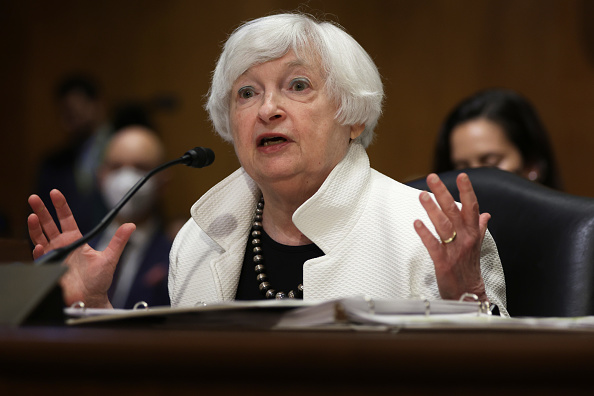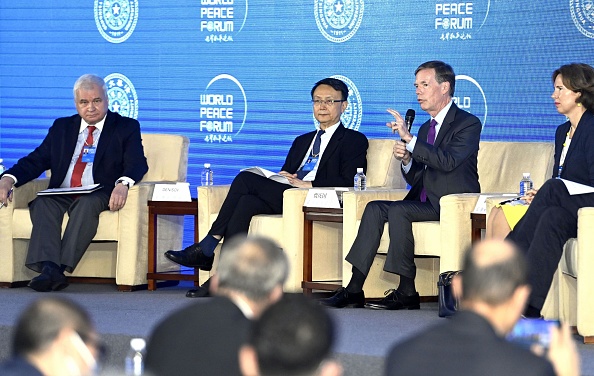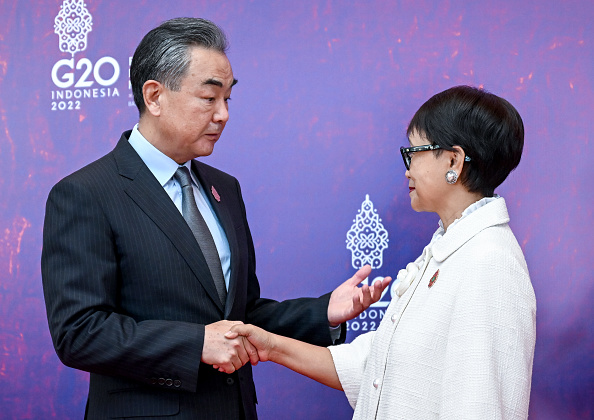
 Easing Tariffs, Not Tensions
Easing Tariffs, Not TensionsAs the Biden administration considers lowering tariffs on hundreds of billions of dollars worth of Chinese goods to tame soaring inflation, U.S. Treasury Secretary Janet Yellen and Chinese Vice Premier Liu He held a virtual meeting to discuss economic issues including international trade and supply chains.
During the call, Yellen "frankly" raised concerns about China's "unfair, non-market" economic policies and Russia's war against Ukraine, the U.S. Treasury Department said in a statement.
The Chinese readout called the discussion "constructive" and stated the importance of coordinating on economic and tariff issues, as well as the importance of stabilizing the global industrial and supply chains.
Some political analysts have noted that while a lift on the Trump administration tariffs would be welcomed by the Chinese, it could be unlikely that the changes would alter the course of the two powers' rivalry, which continues to escalate on both sides of the Pacific.
 A Fresh Rebuke
A Fresh RebukeIn a rare confrontation, the U.S. and Russian Ambassadors to China clashed at a public forum in Beijing. While Nicholas Burns, the United States ambassador, told the World Peace Forum in Beijing that Russia's "unprovoked" invasion was "the greatest threat to the world order," the Russian Ambassador to China Andrey Denisov accused NATO of provoking Russia's action and said the current world order is on the edge of an abyss due to "sabotage" of the United Nations.
Beijing has yet to condemn its strategic ally over the war and has refrained from describing the military campaign as an "invasion." As China pushes back against NATO's new long-term focus on Beijing, Chinese officials have also signed on to Russian messaging of blaming NATO for triggering President Vladimir Putin's decision to go to war.
At a panel session of the 10th World Peace Forum on Monday, organized by Tsinghua University and the Chinese People's Institute of Foreign Affairs, Burns and Denisov were joined by British ambassador to China Caroline Wilson and French ambassador Laurent Bili.
The heated debate between the representatives of the five permanent members of the UN Security Council prompted discussions about how the international order would evolve and how to maintain peace in the most effective way.
Learn more in "Disruption," a video with Richard Weitz, a Senior Fellow at the Hudson Institute.
 Lack of Consensus
Lack of ConsensusForeign ministers from leading global economies gathered in Bali, Indonesia, for a Group of 20 nations meeting this week, including representatives from Russia, China and the U.S. This is the first time Russia's Foreign Minister Sergey Lavrov was in the same room as his counterparts from the G-7 nations since Russian troops invaded Ukraine earlier this year.
Talks were thrown off balance by two unexpected international political developments, including the assassination of Japan's prime minister and longest-serving leader, Shinzo Abe, along with a plea for unity and an end to the war from their Indonesian host. But finding a consensus remained a challenge amid a deepening East-West divide.
Secretary of State Antony Blinken led the U.S. delegation at the G-20 ministerial meeting. U.S. and European officials predominantly focused their remarks on the global effects of Russia's invasion of Ukraine, including higher global energy and food prices. Blinken also met China's Foreign Minister Wang Yi for the first time since October.
Wang delivered a speech at the gathering as well, calling on members to practice true multilateralism and to treat each other as partners as the world endures major challenges. Wang also noted that China will "continue to promote peace talks on the Ukraine issue" and stressed that the country "always stands on the side of peace."
While plans are being made for a G-20 summit later this year, analysts are concerned that the inability to find common ground at this meeting may leave prospects for future cooperation in the forum uncertain.
Read more in "Can China and the EU Work together amidst Difficulties?," by Cui Hongjian, the Director of the Department of European Studies at the China Institute of International Studies.
Prepared by China-US Focus editorial teams in Hong Kong and New York, this weekly newsletter offers you snap shots of latest trends and developments emerging from China every week, while adding a dose of historical perspective.
- 2022-07-01 Getting Tough
- 2022-06-24 Tools in the Box
- 2022-06-17 Unprecedented Oversight
- 2022-06-10 Squaring Off
- 2022-06-03 Diplomatic Chills
- 2022-05-27 Competing Visions
- 2022-05-20 Common Ground
- 2022-05-13 Bilateral Interests
- 2022-05-06 Vying for Mutual Benefit
- 2022-04-29 Seeking Relief
- 2022-04-22 Tipping Point
- 2022-04-15 “Persistence is Victory”
- 2022-04-08 No Divorce
- 2022-04-01 Auditing Accountability
- 2022-03-25 Playing Policy
- 2022-03-18 One Hand Cannot Clap
- 2022-03-11 Political Forecast
- 2022-03-04 Competitive Advantage
- 2022-02-25 A Sovereign Tightrope
- 2022-02-18 Strategic Disengagement
